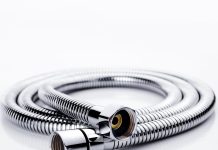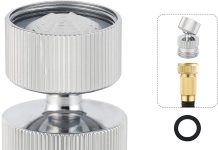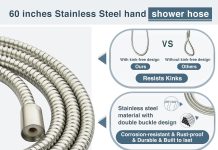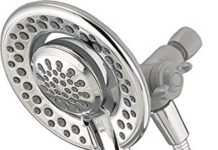Have you ever wondered if you can use a garden hose as a shower hose? Well, we have the answer for you! This article will explore the possibility of making your gardening tool double as a shower accessory.
Whether it’s for camping trips, outdoor showers, or simply a budget-friendly solution, we’ll provide you with all the information you need to know.
So, put on your thinking caps, and find out if your garden hose can turn into a makeshift shower hose!
Table of Contents
Can You Use A Garden Hose As A Shower Hose?
Overview
Having a reliable and functional hose is essential when it comes to showering. While most people are familiar with traditional shower hoses, using a garden hose may have crossed your mind.
This article will explore the possibility of using a garden hose as a shower hose. We will discuss the different types of hoses, what makes a hose suitable for shower use, considerations before using a garden hose as a shower hose, the advantages and disadvantages of using a garden hose, safety tips, alternative options for showering with a garden hose, and conclude with some frequently asked questions.
Different Types of Hoses
Before we delve deeper into the topic, let’s first understand the different types of hoses available. Garden and shower hoses are the two main types, each serving different purposes.
Garden Hoses
Garden hoses are typically used for outdoor activities such as watering plants, washing cars, or cleaning outdoor surfaces. They are designed to withstand outdoor elements and have specific features that cater to these tasks.
Shower Hoses
On the other hand, shower hoses are specifically designed for indoor use in bathrooms. They are typically shorter in length and are made from safe and suitable materials for contact with the skin.
What Makes a Hose Suitable for Shower Use?
Several factors determine whether a hose is suitable for shower use. Consider the following aspects before deciding to use a garden hose as a shower hose:
Length and Flexibility
A shower hose should be long enough to reach all areas of your shower without causing any strain. It should also be flexible for ease of use and maneuverability.
Materials and Durability
A shower hose must be made from materials that are safe for contact with the skin and resistant to wear and tear. Look for hoses made from high-quality materials such as stainless steel or reinforced PVC.
Compatibility with Showerheads and Faucets
Ensure that the garden hose is compatible with your showerhead or faucet. Consider the hose connection size, thread type, and other specifications to ensure a secure and leak-free fit.
Water Pressure and Flow Rate
A suitable shower hose should provide adequate water pressure and a desirable flow rate to ensure a satisfying shower experience. Avoid using a garden hose that may restrict water flow or cause splashing.
Temperature Resistance
Garden hoses are not designed to withstand high temperatures, so make sure the hose you choose can handle hot water if you prefer a warm shower. Some garden hoses are specifically designed for hot water use.
Safety Considerations
Safety should always be a top priority when using any hose for showering. Ensure the hose is free from sharp edges, protruding parts, or potential hazards that could cause injury.
Considerations Before Using a Garden Hose as a Shower Hose
Now that you have a better understanding of what makes a hose suitable for shower use, let’s explore important considerations before using a garden hose as a substitute for a shower hose.
Availability and Accessibility
While garden hoses are more readily available and affordable, consider whether using a garden hose indoors is practical. Ensure that the hose is easily accessible and can be easily attached to your showerhead or faucet.
Compatibility with Indoor Plumbing
Garden hoses may not always be compatible with indoor plumbing systems. Take into account the types of connections and adapters required for proper installation. Consult a professional if needed to ensure compatibility and avoid any potential damage to your plumbing system.
Suitability for Intended Use
Consider the intended purpose of your showering needs. A garden hose may be a suitable option if you are only looking for a temporary solution or need a hose for emergencies or renovations. However, if you seek a long-term, reliable solution, consider investing in a dedicated shower hose.
Potential Health and Hygiene Concerns
Using a garden hose as a shower hose may pose health and hygiene risks. Garden hoses are not designed for regular skin contact, and the materials used in their construction may contain chemicals or contaminants that could be harmful when in contact with your skin.
Comfort and Ease of Use
Remember that garden hoses are not explicitly designed for showering, so they may not provide the same comfort and convenience as dedicated shower hoses. Consider comfort factors such as ergonomic design, lightweight materials, and ease of handling.
Advantages of Using a Garden Hose as a Shower Hose
While a garden hose may not be the conventional choice for a shower hose, there are certain advantages to using one. Let’s explore some of these advantages:
Low Cost and Accessibility
One of the primary advantages of using a garden hose as a shower hose is its affordability and availability. Garden hoses are widely accessible and tend to be more cost-effective compared to dedicated shower hoses.
Easily Adjustable Water Pressure
Garden hoses often allow for easy water pressure adjustment, providing more control over the shower’s intensity. This flexibility can benefit individuals who prefer varying water pressure levels during their showers.
Versatility for Outdoor Use
Since garden hoses are designed for outdoor activities, they can serve a dual purpose. You can use the same garden hose for tasks such as watering plants or washing your car, making it a versatile option.
Temporary Solutions for Emergencies or Renovations
When your shower hose is damaged or during bathroom renovations, a garden hose can be a temporary solution. It can provide a means to continue showering until the necessary repairs or renovations are completed.
Water Conservation
Some garden hoses are designed to be more water-efficient, allowing for reduced water consumption during showers. This can be especially beneficial for individuals concerned about water usage or seeking to conserve water.
Disadvantages of Using a Garden Hose as a Shower Hose
While there are advantages to using a garden hose as a shower hose, there are also several disadvantages to consider:
Lack of Temperature Control
Most garden hoses do not have built-in temperature control mechanisms like dedicated shower hoses. This means you may be unable to adjust the water temperature to your liking, potentially resulting in uncomfortable or unsafe conditions.
Potential Safety Hazards
Garden hoses may not be designed with safety in mind. They may have rough surfaces, sharp edges, or protruding parts that can cause injury or discomfort during showering. Additionally, garden hoses are not insulated, increasing the risk of electric shock if they come into contact with electrical appliances or systems.
Incompatibility with Indoor Plumbing
As mentioned earlier, garden hoses may not be compatible with indoor plumbing systems. The connections, adapters, or fittings required for proper installation may not be readily available, and improper installation could lead to leaks, water damage, or other plumbing issues.
Limited Aesthetics
Garden hoses are primarily designed for functional rather than decorative purposes. Their appearance may not complement the overall aesthetic of your bathroom, potentially detracting from the desired ambiance.
Potential Health Risks
Using a garden hose as a shower hose introduces potential health risks. Garden hoses are not designed for regular contact with the skin, and the materials used in their construction may contain chemicals or contaminants that could be harmful when absorbed or ingested through the skin.
Safety Tips for Using a Garden Hose as a Shower Hose
If you still decide to use a garden hose as a shower hose, it is crucial to follow some safety precautions to minimize risks. Consider the following safety tips:
Inspect and Maintain the Hose Regularly
Regularly inspect the garden hose for any wear, damage, or contamination. Replace the hose if any defects are detected. Additionally, store the hose properly to prevent kinking, tangling, or exposure to extreme temperatures that could affect its performance.
Protective Measures for Hot Weather
During hot weather, garden hoses exposed to sunlight can become extremely hot, increasing the risk of burns. Take precautions to cool the water before using the hose for showering, or use a hose specifically designed for hot water use.
Avoiding Direct Contact with the Hose
Avoid direct contact with the garden hose whenever possible to minimize the risk of cuts, scratches, or other injuries. Use mittens, gloves, or other protective gear when handling the hose to protect your hands and fingers.
Proper Water Temperature Management
As garden hoses typically lack temperature control, take extra care to manage the water temperature. Test the water temperature before using the hose for showering to avoid scalding or discomfort caused by unexpected temperature fluctuations.
Preventing Trips and Falls
Ensure the garden hose is securely and safely positioned within your shower space to minimize the risk of trips and falls during use. Clear any potential obstructions or hazards that could lead to accidents.
Supervision for Children
If children are using the garden hose as a shower hose, adult supervision is essential. Children may not be aware of potential hazards or may not have the physical strength to handle the hose safely. Supervise their showering activities to ensure their safety.
Alternative Options for Showering with a Garden Hose
While using a garden hose as a shower hose is a possible option, there are alternative solutions that may better suit your needs. Consider the following options:
Using Hose Adapters or Connectors
If you are set on using a garden hose as a shower hose, consider using adapters or connectors to make the transition easier. These accessories can help ensure a secure fit and minimize the risk of leaks or other plumbing issues.
Installing a Dedicated Outdoor Shower
Installing a dedicated outdoor shower may be a worthwhile investment for those who frequently utilize garden hoses for outdoor purposes. Outdoor showers are designed for easy access and usage, providing a convenient alternative to indoor garden hoses.
Portable Shower Solutions
Portable shower solutions, such as camping showers or portable showerheads, can provide a more convenient and dedicated option for showering. These portable devices are designed specifically for showering and often offer temperature control, water pressure adjustments, and other features.
Consideration of Campers and RV Owners
If you are a camper or an RV owner, specific shower systems are available that are designed to be used with garden hoses. These systems are often compact, lightweight, and specially designed to accommodate the needs of outdoor enthusiasts.
Utilizing Watering Wands or Sprinkler Attachments
Watering wands or sprinkler attachments can enhance the showering experience with a garden hose. These accessories can provide a more targeted and controlled water flow, making showering with a garden hose more comfortable and enjoyable.
Conclusion
While using a garden hose as a shower hose may seem practical, it is essential to consider the advantages, disadvantages, and safety precautions associated with this option. The lack of temperature control, potential safety hazards, incompatibility with indoor plumbing, and health risks are factors to consider before deciding to proceed.
Exploring alternative options such as dedicated shower hoses, outdoor showers, portable shower solutions, and hose accessories may provide more suitable and reliable alternatives. Ultimately, the choice depends on your specific needs, preferences, and the importance you place on safety, comfort, and hygiene in your showering experience.
FAQs
Here are some frequently asked questions related to using a garden hose as a shower hose:
Can I use any garden hose as a shower hose?
Not all garden hoses are suitable for use in the shower. Consider materials, length, flexibility, and compatibility before using a garden hose indoors.
How long can a garden hose be used for showering?
The lifespan of a garden hose used for showering depends on various factors, such as the quality of the hose, maintenance, and frequency of use. Regular inspection and prompt replacement of damaged or worn-out hoses are essential for safe and effective showering.
Is it safe to drink water from a garden hose used for showering?
Drinking water from a garden hose used for showering is not recommended. The materials used in garden hoses may contain chemicals or contaminants that could be harmful when ingested.
What are some signs that a garden hose is not suitable for showering?
Signs that a garden hose may not be suitable for showering include visible wear or damage, leaks, incompatible connections, or contaminants in the water.
Can I attach a garden hose to my existing showerhead?
In some cases, it may be possible to attach a garden hose to your existing showerhead using adapters or connectors. However, ensure compatibility and consult a professional to avoid damage or plumbing issues.
Are there any health risks associated with using a garden hose as a shower hose?
Using a garden hose as a shower hose introduces potential health risks due to the materials used in their construction, such as chemicals or contaminants. Regular contact with the skin may lead to skin irritation or absorption of harmful substances.
What other options do I have for outdoor showers?
Some alternatives to using a garden hose for outdoor showers include installing dedicated outdoor shower systems, portable shower solutions, and camping or RV shower systems. These options provide more convenience, safety, and comfort for outdoor showering.






















